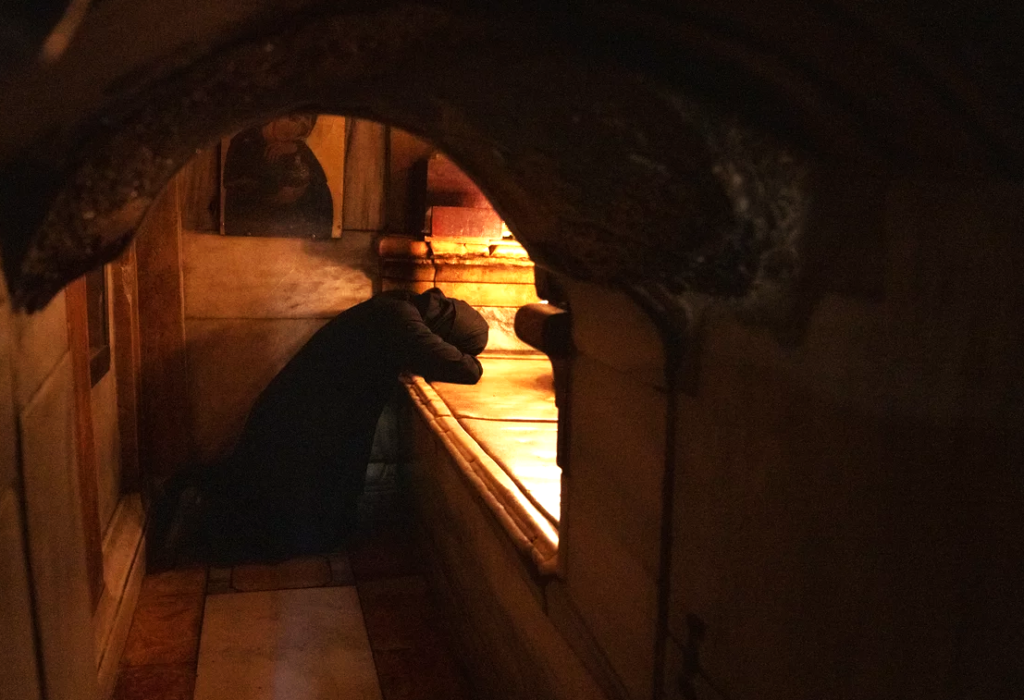Translation of the Gospel According to Luke 18:9-14
At that time, Jesus spoke this parable to some who trusted in themselves as just and despised others. Two men went up into the temple to pray: the one was a pharisee, and the other a publican. The pharisee standing, prayed thus with himself: O God, I give Thee thanks that I am not as the rest of men, extortioners, unjust, adulterers; as also is this publican. I fast twice in the week; I give tithes of all that I possess. And the publican standing afar off would not so much as lift up his eyes towards heaven, but struck his breast saying: O God, be merciful to me a
sinner. I say to you, this man went down to his house justified rather than the other: because everyone that exalts himself shall be humbled, and he that humbles himself shall be exalted.
A Message From Pope Benedict XVI’s Homily Papal Mass for the Closing of the Special Assembly for the Middle East of the Synod of Bishops, Oct. 24, 2010.
We are gathered once again on the Lord’s day, at the Altar of the Confession in St Peter’s Basilica… This morning we… came to the temple to pray: in this, we are touched directly by the parable of the pharisee and the publican, told by Jesus and recounted by the Evangelist St Luke (cf. Luke 18:9-14). We too may be tempted, like the pharisee, to tell God of our merits, perhaps thinking of our work during [the preceding week]. However, to rise up to Heaven, prayer must emanate from a poor, humble heart. And therefore we too… wish to first and foremost give thanks to God, not for our merits, but for the gift that He has given us. We recognize ourselves as small and in need of salvation, of mercy; we recognize all that comes from Him and that only with his Grace we may realize what the Holy Spirit told us. Only in this manner may we return home truly enriched, made more just and more able to walk in the path of the Lord.
[Scripture] stresses the theme of prayer, emphasizing that it is much more powerful to God’s heart when those who pray are in a condition of need and are afflicted. The prayer of the humble pierces the clouds affirms Ecclesiasticus (Sir 35:21); and the Psalmist adds: Yahweh is near to the broken-hearted, he helps those whose spirit is crushed (Psa 34:18). Our thoughts go to our numerous brothers and sisters who live in the region of the Middle East and who find themselves in trying situations, at times very burdensome, both for the material poverty and for the discouragement, the state of tension and at times of fear. The Word of God also offers us a light of consoling hope, there where He presents prayer, personified, that until he has eliminated the hordes of the arrogant and broken the sceptres of the wicked, until he has repaid all people as their deeds deserve and human actions as their intentions merit (Sir 35:21-22). This link too, between prayer and justice makes us think of many situations in the world, particularly in the Middle East. The cry of the poor and oppressed finds an immediate echo in God, who desires to intervene to open up a way out, to restore a future of freedom, a horizon of hope.
…
The words of the Lord Jesus may be applied to Christians in the Middle East: There is no need to be afraid, little flock, for it has pleased your Father to give you the kingdom (Luke 12:32). Indeed, even if they are few, they are bearers of the Good News of the love of God for man, love which revealed itself in the Holy Land in the person of Jesus Christ. This Word of salvation, strengthened with the grace of the Sacraments, resounds with particular potency in the places in which, by Divine Providence, it was written, and it is the only Word which is able to break that vicious circle of vengeance, hate, and violence. From a purified heart, in peace with God and neighbour, may intentions and initiatives for peace at local, national, and international levels be born. In these actions, to whose accomplishment the whole international community is called, Christians as full-fledged citizens can and must do their part with the spirit of the Beatitudes, becoming builders of peace and apostles of reconciliation to the benefit of all society.
Conflicts, wars, violence and terrorism have gone on for too long in the Middle East. Peace, which is a gift of God, is also the result of the efforts of men of goodwill, of the national and international institutions, in particular of the states most involved in the search for a solution to conflicts. We must never resign ourselves to the absence of peace. Peace is possible. Peace is urgent. Peace is the indispensable condition for a life worthy of humanity and society. Peace is also the best remedy to avoid emigration from the Middle East. Pray for the peace of Jerusalem we are told in the Psalm (Psa 122:6). We pray for peace in the Holy Land. We pray for peace in the Middle East, undertaking to try to ensure that this gift of God to men of goodwill should spread through the whole world.



